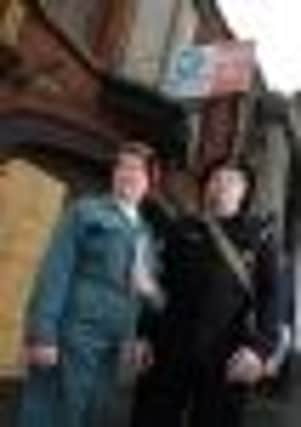The longest night... how movie fans outsmarted Luftwaffe


Hull’s National Picture Theatre is virtually unchanged since it was attacked by enemy aircraft on the night of March 17 1941 – when it was showing Charlie Chaplin’s satire The Great Dictator.
Unable to get to shelters because of the severity of the raid, 150 people crammed into the foyer, but remarkably all survived when an airborne mine landed at the rear of premises, destroying the screen and gutting the building.
Advertisement
Hide AdAdvertisement
Hide AdOthers were less fortunate and 96 died as a result of the seven-hour raid.
On the 70th anniversary of the raid, campaigners are pressing ahead with plans to create a tribute to those who served on the Home Front, a memorial to the 1,200 civilians who died in the Nazi bombardment and an educational resource for generations of schoolchildren for whom the Second World War is a distant concept.
Stoutly-built, its brick walls withstood the blast, but today the interior is more like a woodland, with trees thrusting past bare girders to an open sky. The front is obscured by advertising hoardings, but the metal window frames are still in place, an evocative reminder of the night the bomb landed, shattering the glass. Roots and ivy festoon the stage and exposed staircases climb towards the circle, lost 70 years ago.
The National Civilian WW2 Memorial Trust has raised £1,000 to fund a planning application that it hopes to submit to Hull Council next month.
Advertisement
Hide AdAdvertisement
Hide AdAmong the donations was £100 from the screen and stage writer Alan Plater, just days before his death last June aged 75. Plater was born in Jarrow-on-Tyne, although his family moved to Hull in 1938.
Under the plans the theatre’s handsome brick frontage would be conserved, as would the empty shell and plaques with the names of the dead hung on the walls. The adjacent Swan Inn, the area’s last remaining bow-fronted pub, would be converted back to its wartime layout and a micro-brewery built. The plans, including a stand-alone education building, would cost a minimum of £750,000.
Trust secretary Mr Canvess said: “We hope that when we get it in and approved it will be another step to persuade the council and the public we are serious.
“People on the Home Front, the air-raid wardens, police, fire brigade and ambulance crews are often forgotten and this will be a tribute to the work they did. The educational side will be imperative.
Advertisement
Hide AdAdvertisement
Hide Ad“It gives schoolchildren a chance to see a bomb site which they’d otherwise only see on film or in books.”
The building – the only Blitzed civilian building ruin left standing in England – was given a grade II listing in 2007, and has been described as of “iconic importance” and “one of the most powerful reminders of one of the most formative periods of the 20th century.”
Keith Miller, from English Heritage, said: “It emphasises the importance of cinemas as part of the war effort for entertainment and news bulletins in an age when people had radios but no TVs. It is nationally unique, an extremely rare survival and stands comparison with some of the buildings that have been preserved in other parts of Europe.”
Lord Mayor Councillor Dave Gemmell – whose father Archie “spent the war picking up pieces of bodies and taking them to the mortuary”, said: “I think it’s brilliant, it really needs preserving.
Advertisement
Hide AdAdvertisement
Hide Ad“The educational part is so important, it’s not children who don’t know about the war now, it’s their parents. History repeats itself and the only way you learn is knowing what went on before.”
During the war Hull was the most heavily bombed British city outside London. Air raids went on longer in Hull than any other city, even after the opening of the Russian front.
It was subject to the first daylight air-raid on Britain during the war and coincidentally, the last piloted attack on 17 March 1945 when people leaving the Savoy Cinema became the UK’s last victims of the Blitz.
Wartime Home Secretary Herbert Morrison wrote in his memoirs: “In my experience the town that suffered most was Kingston-upon-Hull.”